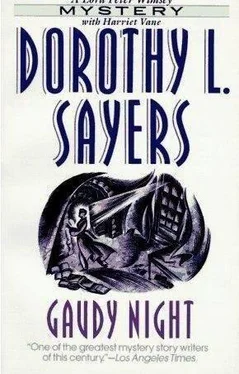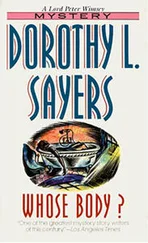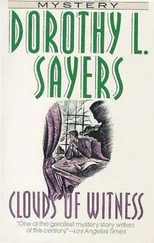Dorothy Sayers - Gaudy Night
Здесь есть возможность читать онлайн «Dorothy Sayers - Gaudy Night» весь текст электронной книги совершенно бесплатно (целиком полную версию без сокращений). В некоторых случаях можно слушать аудио, скачать через торрент в формате fb2 и присутствует краткое содержание. Жанр: Детектив, на английском языке. Описание произведения, (предисловие) а так же отзывы посетителей доступны на портале библиотеки ЛибКат.
- Название:Gaudy Night
- Автор:
- Жанр:
- Год:неизвестен
- ISBN:нет данных
- Рейтинг книги:4 / 5. Голосов: 2
-
Избранное:Добавить в избранное
- Отзывы:
-
Ваша оценка:
- 80
- 1
- 2
- 3
- 4
- 5
Gaudy Night: краткое содержание, описание и аннотация
Предлагаем к чтению аннотацию, описание, краткое содержание или предисловие (зависит от того, что написал сам автор книги «Gaudy Night»). Если вы не нашли необходимую информацию о книге — напишите в комментариях, мы постараемся отыскать её.
Gaudy Night — читать онлайн бесплатно полную книгу (весь текст) целиком
Ниже представлен текст книги, разбитый по страницам. Система сохранения места последней прочитанной страницы, позволяет с удобством читать онлайн бесплатно книгу «Gaudy Night», без необходимости каждый раз заново искать на чём Вы остановились. Поставьте закладку, и сможете в любой момент перейти на страницу, на которой закончили чтение.
Интервал:
Закладка:
Miss Schuster-Slatt said she thought English husbands were lovely, and that she was preparing a questionnaire to be circulated to the young men of the United Kingdom, with a view to finding out their matrimonial preferences.
“But English people won’t fill up questionnaires,” said Harriet.
“Won’t fill up questionnaires?” cried Miss Schuster-Slatt, taken aback.
“No,” said Harriet, “they won’t. As a nation we are not questionnaire-conscious.”
“Well, that’s too bad,” said Miss Schuster-Slatt. “But I do hope you will join the British Branch of our League for the Encouragement of Matrimonial Fitness. Our President, Mrs. J. Poppelhinken, is a wonderful woman. You would so much like to meet her. She will be coming to Europe next year. In the meantime I am here to do propaganda and study the whole question from the angle of British mentality.”
“I’m afraid you will find it a very difficult job. I wonder,” added Harriet (for she felt she owed Miss Schuster-Slatt a riposte for her unfortunate observations of the night before), “whether your intentions are as disinterested as you make out. Perhaps you are thinking of investigating the loveliness of English husbands in a personal and practical way.”
“Now you’re making fun of me,” said Miss Schuster-Slatt with perfect good-humour. “No. I’m just the little worker-bee, gathering honey for the queens to eat.”
“How all occasions do inform against me!” muttered Harriet to herself. One would have thought that Oxford at least would offer a respite from Peter Wimsey and the marriage question. But although she herself was a notoriety, if not precisely a celebrity, it was an annoying fact that Peter was a still more spectacular celebrity, and that, of the two, people would rather know about him than about her. As regards marriage-well, here one certainly had a chance to find out whether it worked or not. Was it worse to be a Mary Attwood (nee Stokes) or a Miss Schuster-Slatt? Was it better to be a Phoebe Bancroft (nee Tucker) or a Miss Lydgate? And would all these people have turned out exactly the same, married or single?
She wandered into the J.C.R., which was empty, but for one drab and ill-dressed woman who sat desolately reading an illustrated paper. As Harriet passed, this woman looked up and said, rather tentatively, “Hullo! it’s Miss Vane, isn’t it?”
Harriet racked her memory hastily. This was obviously someone very much senior to herself-she looked nearer fifty than forty. Who on earth?
“I don’t suppose you remember me,” said the other. “Catherine Freemantle.”
(Catherine Freemantle, good God! But she had been only two years senior to Harriet. Very brilliant, very smart, very lively and the outstanding scholar of her year. What in Heaven’s name had happened to her?)
“Of course I remember you,” said Harriet, but I’m always so stupid about names. What have you been doing?”
Catherine Freemantle, it seemed, had married a farmer, and everything had gone wrong. Slumps and sickness and tithe and taxes and the Milk Board and the Marketing Board, and working one’s fingers to the bone for a bare living and trying to bring up children-Harriet had read and heard enough about agricultural depression to know that the story was a common one enough. She was ashamed of being and looking so prosperous. She felt she would rather be tried for life over again than walk the daily treadmill o1 Catherine’s life. It was a saga, in its way, but it was preposterous. She broke in rather abruptly upon a complaint against the hardheartedness of the Ecclesiastical Commissioners.
“But, Miss Freemantle-I mean, Mrs.-Mrs. Bendick-it’s absurd that you should have to do this kind of thing. I mean, pick your own fruit and get up at all hours to feed poultry and slave like a navvy. Surely to goodness it would have paid far better for you to take on some kind of writing or intellectual job and get someone else to do the manual work.”
“Yes, it would. But at the beginning I didn’t see it like that. I came down with a lot of ideas about the dignity of labour. And besides, at that time, my husband wouldn’t have liked it much if I’d separated myself from his interests. Of course, we didn’t think it would turn out like this.”
What damned waste! was all Harriet could say to herself. All that brilliance, all that trained intelligence, harnessed to a load that any uneducated country girl could have drawn, and drawn far better. The thing had its compensations, she supposed. She asked the question bluntly.
Worth it? said Mrs. Bendick. Oh, yes, it was certainly worth it. The job was worth doing. One was serving the land. And that, she managed to convey, was a service harsh and austere indeed, but a finer thing than spinning words on paper.
“I’m quite prepared to admit that,” said Harriet. “A ploughshare is a nobler object than a razor. But if your natural talent is for barbering, wouldn’t it be better to be a barber, and a good barber-and use the profits (if you like) to speed the plough? However grand the job may be, is it your job.”
“It’s got to be my job now,” said Mrs. Bendick. “One can’t go back to things. One gets out of touch and one’s brain gets rusty. If you’d spent your time washing and cooking for a family and digging potatoes and feeding cattle, you’d know that that kind of thing takes the edge off the razor. You needn’t think I don’t envy you people your easy life; I do. I came to the Gaudy out of sentiment, and I wish I’d stopped away. I’m two years older than you, but I look twenty. None of you care in the least for my interests, and yours all seem to me to be mere beating the air. You don’t seem to have anything to do with real life. You are going about in a dream.” She stopped speaking, and her angry voice softened. “But it’s a beautiful dream in its way., It seems queer to me now to think that once I was a scholar… I don’t know. You may be right after all. Learning and literature have a way of outlasting the civilization that made them.”
“The word and nought else
in time endures.
Not you long after,
perished and mute
will last, but the defter
viol and lute,” quoted Harriet. She stared vaguely out into the sunshine. “It’s curious-because I have been thinking exactly the same thing-only in a [different connection. Look here! I admire you like hell, but I believe you’re all wrong. I’m sure one should do one’s own job, however trivial, and not persuade one’s self into doing somebody else’s, however noble.”
As she spoke, she remembered Miss de Vine; here was a new aspect of persuasion.
“That’s all very well,” replied Mrs. Bendick. “But one’s rather apt to marry into somebody else’s job.”
True; but Harriet was offered the opportunity of marrying into a job as near her own as made no great difference. And into money enough to make any Job supererogatory. Again she saw herself unfairly provided with advantages which more deserving people desired in vain.
“I suppose,” she said, “marriage is the really important job, isn’t it?”
“Yes, it is,” said Mrs. Bendick. “My marriage is happy as marriages go. But I often wonder whether my husband wouldn’t have been better off with another kind of wife. He never says so, but I wonder. I think he knows I miss-things, and resents it sometimes. I don’t know why I should say this to you-I’ve never said it to anybody and I never knew you very well, did I?”
“No; and I haven’t been very sympathetic, either. In fact, I’ve been disgustingly rude.”
“You have, rather,” said Mrs. Bendick. “But you have such a beautiful voice to be rude in.”
“Good gracious!” said Harriet.
“Our farm’s on the Welsh border, and the people all speak in the most hideous local sing-song. Do you know what makes me feel most homesick here? The cultured speech. The dear old much-abused Oxford accent That’s funny, isn’t it?”
Читать дальшеИнтервал:
Закладка:
Похожие книги на «Gaudy Night»
Представляем Вашему вниманию похожие книги на «Gaudy Night» списком для выбора. Мы отобрали схожую по названию и смыслу литературу в надежде предоставить читателям больше вариантов отыскать новые, интересные, ещё непрочитанные произведения.
Обсуждение, отзывы о книге «Gaudy Night» и просто собственные мнения читателей. Оставьте ваши комментарии, напишите, что Вы думаете о произведении, его смысле или главных героях. Укажите что конкретно понравилось, а что нет, и почему Вы так считаете.












